MercoPress. South Atlantic News Agency
Tag: Joaquim Levy
-
Thursday, July 23rd 2015 - 08:52 UTC
Brazil's recession expected to continue next year according to top bank
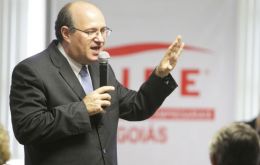
Brazil's recession will extend into next year, hurting President Dilma Rousseff's efforts to shore up public finances and arrest a sharp increase in unemployment, Itau Unibanco's chief economist said in a report on Wednesday. Ilan Goldfajn forecasts a drop of 2.2% in 2015 and 0.2% in 2016, down from previous estimates for a decline of 1.7% in 2015 and an increase of 0.3% in 2016.
-
Thursday, July 23rd 2015 - 08:02 UTC
Brazil slashes fiscal savings' goals for 2015 and 2016 on plunging tax revenue
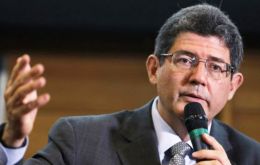
Brazil dramatically lowered its fiscal savings goals for 2015 and 2016 on Wednesday due to plunging tax revenues, and announced new spending cuts to underscore its commitment to austerity. The government cut its primary surplus goal for this year to 8.7 billion reais ($2.70 billion), or 0.15% of GDP, from 66.3 billion reais, the equivalent of 1.1% of GDP, originally budgeted.
-
Monday, July 20th 2015 - 07:30 UTC
Brazil's Levy warns that relaxing spending cuts will only extend the pain

Brazil's Finance minister Joaquim Levy warned that any attempt to relax spending-reduction goals for this year would inevitably extend the duration of the current fiscal adjustment program. The statement was made on Sunday in a long interview with one of Brazil's leading dailies, Folha de Sao Paulo.
-
Thursday, July 9th 2015 - 06:46 UTC
Brazil's six-month inflation at 6.17%, highest for half year since 2003
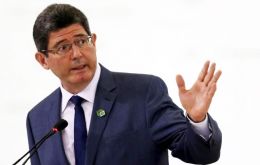
Brazil's inflation was little changed at 0.79% in June, rising to 8.89% over the last 12, reported the Brazilian Institute of Geography and Statistics, IBGE, on Wednesday. May's rate was 0.74%. Main price rises accounting for a third of June's inflation included 29.19% for plane tickets, 4.95% in water taxes and gambling rates, officials said.
-
Thursday, July 2nd 2015 - 06:04 UTC
Brazil's budget during May back in the red; Congress restless about austerity

Brazil reported a primary budget deficit for May that was its widest for 2015, making its annual savings goal more difficult to achieve despite government efforts to raise taxes and cut spending. Central bank data showed a primary budget deficit of 6.9 billion Reais ($2.23 billion). This compared with a primary surplus of 13.445 billion Reais in April.
-
Saturday, June 13th 2015 - 07:59 UTC
Rousseff and Lula da Silva try to convince the party to support austerity measures
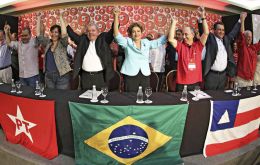
Brazil's embattled president Dilma Rousseff with the help of her political mentor. Lula da Silva managed on Thursday night to plea support from the ruling Workers Party, WP, delegates for drastic spending cuts designed to restore confidence in Latin America's largest but battered economy.
-
Thursday, June 4th 2015 - 08:54 UTC
Despite a contracting economy Brazil increases basic interest rate to 13.75%

Brazil raised interest rates to the highest levels in more than six years on Wednesday, extending a tightening campaign and leaving the door open for more hikes despite concerns that steep borrowing costs could deepen an expected economic recession.
-
Sunday, May 24th 2015 - 08:02 UTC
President Rousseff to face criminal complaint over 'cosmetic' accounting
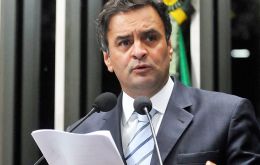
Brazil´s main opposition party plans to pursue a criminal complaint against President Dilma Rousseff for 'inventive' accounting that helped shore up the country´s fiscal results in recent years.
-
Saturday, May 23rd 2015 - 06:27 UTC
Brazil announces US$ 22.5bn spending cuts and confirms minister Levy
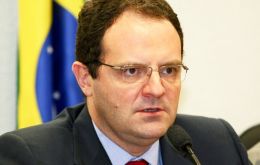
Brazil finally announced its much expected budget resources reshuffle that will freeze 69.9 billion Reais (22.58 billion dollars) worth of spending on investment, education and health programs this year, limiting outlays in a bid to convince investors that President Dilma Rousseff is committed to saving the country's investment-grade rating.
-
Friday, May 22nd 2015 - 08:16 UTC
Brazil heading for full recession: economic activity down, unemployment up

Economic activity in Brazil tumbled in the first quarter and unemployment climbed to a near four-year high, adding to signals that a looming recession could worsen as President Dilma Rousseff reins in public spending.
